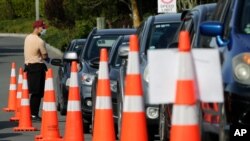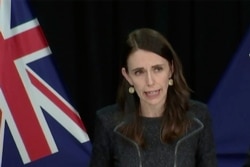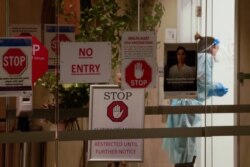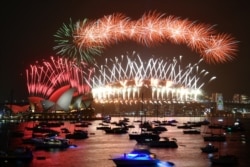New Zealand’s general election due next month has been postponed for four weeks because of a spike in coronavirus cases. The prime minister, Jacinda Ardern, says the new date on 17 October gives parties the opportunity to plan their campaigns around any Covid-19 restrictions.
In Australia, a state of emergency has been extended as the state of Victoria records another grim milestone. More than 400 people have died from the virus in Australia, and 22 in New Zealand.
New Zealand’s Prime minister Jacinda Ardern had been under increasing pressure to delay an election due in September. Most campaigning has been halted by a spike in coronavirus cases in Auckland, which is under a two-week lockdown.
Ardern says polling day will now be on October 17.
“Moving an election date especially this late in the electoral cycle is a significant decision," she said. "Our resurgence plan is in full swing. There are high levels of testing, rapid contact tracing alongside the level three restrictions that are all designed to limit the spread of the current cluster. However, it is clear that the re-emergence of Covid in Auckland at the beginning of the formal campaign period has been cause for concern.”
The source of the infections is still a mystery.
New Zealand’s main opposition National Party had argued the election should be delayed until November, or even into next year. They believe restrictions on campaigning because of the pandemic would give the prime minister an unfair advantage.
Jacinda Ardern had been widely praised for crushing the virus and is expected to win another term. But her opponents hope she will lose some of her luster once hardships caused by the Auckland lockdown begin to bite.
Across the Tasman Sea, Australia has recorded its deadliest day of the pandemic so far. 25 people have died in the state of Victoria in the past day. 282 new coronavirus cases have been reported, prompting some optimism by disease experts.
Professor Jodie McVernon, the director of epidemiology at the Doherty Institute in Melbourne says daily infection rates in Victoria are going down.
“We have obviously been in a situation just a few weeks ago where we were seeing numbers in the 700s," he said. "Those numbers are now coming down into the 200s, or maybe around 300, and with that we are seeing fewer numbers of contacts of cases being reported. We are seeing less clusters and outbreaks being reported and overall, the number of healthcare worker infections are coming down. All of those are really positive indicators.”
Victoria has also extended a state of emergency for another month. The city of Melbourne remains in lockdown, and other restrictions apply across the entire state.
Organizers of Sydney’s New Year’s Eve fireworks are under increasing pressure to cancel the famous display because of the pandemic. The city council is conceding that it “may not be responsible" to encourage large crowds to the glittering spectacle.
The city of Melbourne could also lose the rights to host the Australian Rules Football grand final, the nation’s biggest sporting event, in October because of the COVID-19 crisis.







